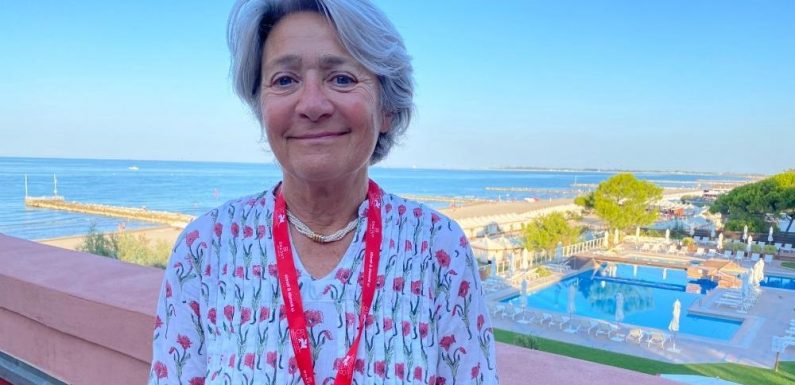
Acclaimed French producer Catherine Dussart has a full production slate including new works from veterans Amos Gitai, Rithy Panh and Peter Greenaway.
Dussart is currently at the Venice Film Festival where Indian filmmaker Aditya Vikram Sengupta’s “Once Upon a Time in Calcutta,” co-produced by her Catherine Dussart Productions, is playing in the Horizons strand. Dussart is also on board Sengupta’s next, “Birthmark,” about two women who become part of a catastrophic plan hatched by a patriarchal family, which is at the Venice gap financing market.
Gitai started a Dussart-produced trilogy about Israelis and Palestinians engaging with each other harmoniously with “A Tramway in Jerusalem,” which won the UNIMED Award at Venice in 2018. The second, “Laila in Haifa” was in the reckoning for a Venice Golden Lion in 2020. “Shikun,” which completes the trilogy, is set in a massive social housing project in Beersheba, in the Negev desert. The film, which will start production in early 2022, follows the lives of 20 characters who live in the project.
Dussart and Gitai are also preparing “Dona Gracia,” the story of Gracia Mendes Nasi, a Portuguese Jewish woman in 1500s Renaissance Europe, who developed an escape network that saved hundreds of Jews forcibly converted to Catholicism from the Inquisition. She later found favor with the Ottoman Empire in Turkey and convinced them to give her some land in the Galilee area, which incorporates Nazareth, to house the escaped Jews, creating one of the first Jewish settlements in the region, some 400 years before the formation of the state of Israel.
Dussart has also produced several of Cambodian auteur Rithy Panh’s works, including “The Missing Picture,” which won the Un Certain Regard Award at Cannes in 2013 and was Oscar nominated. The pair’s 14th collaboration, the docu-fiction “Everything Will Be OK,” which takes its title from the T-shirt slogan of Angel, a teenager killed in the Myanmar protests this spring. “It’s about totalitarianism, it’s about democracy, and a new way of communication,” Dussart told Variety.
Like “The Missing Picture,” “Everything Will Be OK” will feature puppet figurines, with several of them being animals in the style of George Orwell’s “Animal Farm” or the animals in La Fontaine’s “Fables.” The project is now in post-production and will be ready by early 2022, to be considered for inclusion at the Berlin Film Festival, where Panh won the Berlin Documentary Award for “Irradiés” in 2020.
Greenaway’s “Walking to Paris,” on which Dussart is a co-producer, will be complete by November. The film retraces the sculptor Constantin Brâncusi’s walks from Bucharest to Paris in 1903 and 1904, before he became one of the most lauded artists of the 20th century.
Dussart is also known for producing films by emerging talents from Asia, including Sengupta’s “Jonaki” and Nepalese filmmaker Min Bahadur Bham’s “The Black Hen,” which won the critics’ award at Venice in 2015. Bham’s next, “A Year of Cold,” also produced by Dussart, was due to film in Nepal when the pandemic struck. The film, with a backdrop of the polyandry custom in some parts of the country, traces a difficult and life-affirming journey deep in the Himalayas.
Philosophically, Dussart does not differentiate between working with seasoned veterans and emerging talents. “They all have the same way of making cinema – all of them have high artistic potential and ambitions and all are disruptive and politically strong,” says Dussart. “It’s not intimate cinema, it’s always cinema related to the state of the world. I always like directors with a strong personality and a strong artistic identity.”
Regarding the current state of affairs in the world of independent cinema Dussart hopes that the streaming platforms will not absorb the independent film market, because she fears that they will end up making the same kind of films as the studios, leading to a loss of diversity. She also notes that theatrical revenues have shrunk since the reopening of cinemas, with younger audiences preferring to consume content on personal devices.
“It’s more and more difficult to finance to finance films and it is even more difficult to distribute them than to produce,” said Dussart. But, the producer remains optimistic and explains how each new art form led to the announcement of the death of an older one, but all have survived.
Source: Read Full Article